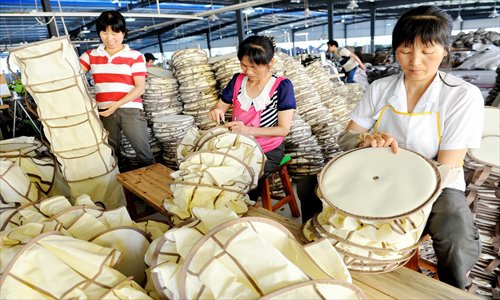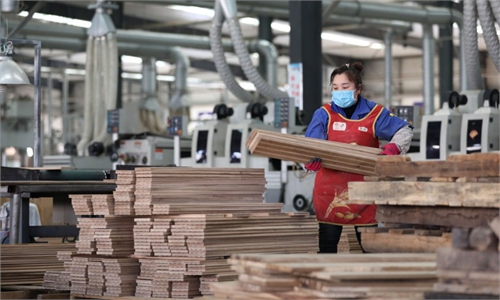
Workers pack a foldable pet product for export in a private company in Wuyuan, East China's Jiangxi Province. File Photo: VCG
The National Development and Reform Commission (NDRC), China's top economic planner, held its third meeting in a month with private company representatives on Monday to learn about their business situation and operating difficulties, vowing to address their concerns.
Companies from sectors including metallurgy, electronic components, food processing and modern logistics were invited to the meeting, with representatives from Zhejiang-based chemical and logistics firm Transfar Group, metallurgy firm China Fangda Group, dairy products maker China Feihe and supplier of precision optical instruments Zolix, according to a statement released by the NDRC on Monday.
Some of these companies are from traditional industries while some are small and medium-sized enterprises that specialize in a niche market and boast cutting-edge technologies, according to the NDRC.
Private entrepreneurs introduced their operation and development status and the difficulties faced by their businesses, as well as their suggestions on macro policies, read the statement.
Zheng Shanjie, head of the NDRC, made specific responses to the pledges and suggestions made by private enterprises on policies and said manufacturing is the foundation of a country. Zheng emphasized the need to accelerate the construction of a modern industrial system with advanced high-end manufacturing as its backbone and the further integration of modern services.
Zheng said the NDRC will further optimize its communication channels with private companies and hold such meetings on a regular basis. Economic planners at the local level will also be guided to listen to the calls of private companies, optimize the business environment, and foster concerted efforts for the sound development of the private sector.
Monday's meeting brought the total number of companies to have had talks with the NDRC in July to over a dozen.
Previously, senior executives from heavy machinery maker SANY Group, home appliances producer AUX Group, Shanghai YTO Express (Logistics) Co, down producer Bosideng, bottled water supplier Nongfu Spring Co, leading tech giant Baidu, solar energy company LONGi Green Energy Technology Co, pharmaceutical company Jemincare, tourism agency Spring Tour, and Donkey Meat Cao Catering were among those who met with Zheng.
China's key first-half economic statistics showed the resilience of the world's second-largest economy despite multiple headwinds, with a GDP growth rate of 5.5 percent for the first half. Fixed-asset investment was up 3.8 percent year-on-year but private sector investment was down 0.2 percent compared with the same period last year.
Some institutions, including the IMF, reportedly said weaker private investment was among factors slowing the Chinese economy down.
Besides the NDRC, multiple Chinese departments have vowed to further enhance support for private enterprises, in a bid to promote the healthy and high-quality development of the private economy, further boosting market confidence and consolidating the foundations of economic recovery.
According to data released by the People's Bank of China last Friday, the balance of inclusive loans for small and micro enterprises reached 27.7 trillion yuan ($3.88 trillion) as of the end of June, up 26 percent year-on-year.
On July 12, Chinese Premier Li Qiang presided over a meeting with platform operators including Alibaba, Douyin and Xiaohongshu, calling on relevant authorities at all levels to create a fair and competitive market environment, along with improved policies, and to establish a sound, transparent and predictable regulatory system for normalized regulation.
The private sector will see new opportunities for development as China keeps improving the business environment, analysts said, refuting the "crackdown" hype in the foreign media.
Global Times

